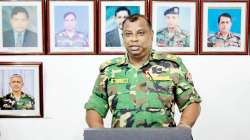No large-scale infiltration, migration of people from Bangladesh into India: BGB DG
"We have intercepted only about 100 such crossers in the last six months along the 4,096-km border that the two countries share," he told PTI.

DG of the Border Guards Bangladesh (BGB) Maj Gen Shafeenul Islam on Friday said there was no large-scale infiltration or migration of people from Bangladesh into India.
"We have intercepted only about 100 such crossers in the last six months along the 4,096-km border that the two countries share," he told PTI.
"There is no large-scale infiltration from Bangladesh. As you know that the development curve in Bangladesh...we are having a GDP of 7.1 and the people enjoy a very good life now in Bangladesh.
"So, there is hardly any migration in an organised way or in large-scale," Islam told reporters at a BSF camp here.
He held a press conference with his counterpart BSF Director General (DG) K K Sharma at the end of a six-day visit and bi-annual meeting between the two sides here.
The people (Bangladeshis) that are mostly crossing, the BGB DG said, because of the cultural ties and historic relations that they have just across the border.
"Many of the relatives are there (across the border in India) and they are still staying and they are visiting in that connection. So, mostly the illegal crossing is taking place due to these reasons. But, they come back after visiting their friends and family who are still living across the border. We have found out that this is mostly the case," he said.
Border Security Force (BSF) DG Sharma, on his part, said they have apprehended a total of 1,522 illegal Bangladeshi migrants this year till now and they were subsequently handed over to the local police.
Out of these, 166 were inadvertent crossers while some were victims of human trafficking, the BSF DG said.
"We are sensitising our troops to differentiate between the victim and the perpetrator of the crime of human trafficking," Sharma said.
Both the chiefs, at the end of their bi-annual talks here, said incidents of cattle smuggling across this border have gone down over the years.
"Cattle smuggling (incidents), off late, has come down. There are many reasons for this, one being that we are more vigilant. Another is that there is less demand on the other side (Bangladesh) as they have stared dairy farming, and animal husbandry is a very important economic activity now and lots of loans are being given in Bangladesh (to people who want to rear cattle).
"I am not saying it has been completely stopped but since ages the local population is dependent on that and there are a number of riverine and 'nallah' gaps on that border and it is comparatively easy to push animals and receive them on the other side," Sharma said.
So, physically at times, curbing the cattle smuggling crime becomes very difficult, he said.
The visiting BGB chief also agreed and said the number of killings of Bangladeshi people at the hands of the BSF along the 4,096-kms shared border has come down as a number of them were involved in cattle smuggling.
"Bangladesh has more concern about border killings and this is mostly happening with those who were associated with cattle smuggling. Having understood that, both the forces have worked together on this front...we were able to take down (the figure of border killing) to only one.
"We have agreed to take it down to zero level. We are alert at the border so that it (cattle smuggling) does not take place. This is also impacting the economy of Bangladesh and we have seen that we are almost self-sufficient with regard to cattle. We also want that this should completely stop at the border and having that objective in mind we are closely working with BSF," Islam said.
However, BSF DG Sharma was at variance with the BGB DG on this and said, "I am very happy to say that this year there has been not a single death (of any Bangladeshi) on this border."
The two forces also decided to open five more 'crime free' zones on the border, on the lines of the one that was launched along the India-Bangladesh frontier in March in West Bengal.
A crime-free zone is a selected border location that is clear of illegal, anti-social and criminal activities by integrating the efforts of the BSF and the BGB, with assistance from the district administration, NGOs and border population of both the countries, the BSF officer explained.
(With PTI inputs)